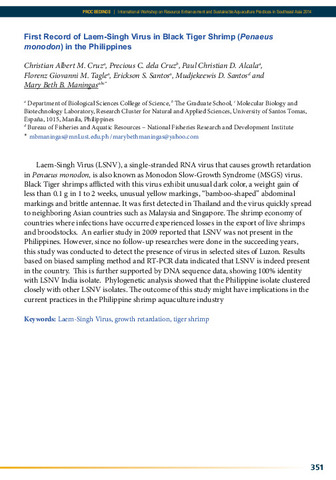First record of Laem-Singh virus in black tiger shrimp (Penaeus monodon) in the Philippines
Share
Abstract
Laem-Singh Virus (LSNV), a single-stranded RNA virus that causes growth retardation in Penaeus monodon, is also known as Monodon Slow-Growth Syndrome (MSGS) virus. Black Tiger shrimps afflicted with this virus exhibit unusual dark color, a weight gain of less than 0.1 g in 1 to 2 weeks, unusual yellow markings, bamboo-shaped abdominal markings and brittle antennae. It was first detected in Thailand and the virus quickly spread to neighboring Asian countries such as Malaysia and Singapore. The shrimp economy of countries where infections have occurred experienced losses in the export of live shrimps and broodstocks. An earlier study in 2009 reported that LSNV was not present in the Philippines. However, since no follow-up researches were done in the succeeding years, this study was conducted to detect the presence of virus in selected sites of Luzon. Results based on biased sampling method and RT-PCR data indicated that LSNV is indeed present in the country. This is further supported by DNA sequence data, showing 100% identity with LSNV India isolate. Phylogenetic analysis showed that the Philippine isolate clustered closely with other LSNV isolates. The outcome of this study might have implications in the current practices in the Philippine shrimp aquaculture industry.
Description
Abstract only.
Suggested Citation
Cruz, C. A. M., dela Cruz, P. C., Alcala, P. C. D., Tagle, F. G. M., Santos, E. S., Santos, M. D., & Maningas, M. B. B. (2015). First record of Laem-Singh virus in black tiger shrimp (Penaeus monodon) in the Philippines. In M. R. R. Romana-Eguia, F. D. Parado-Estepa, N. D. Salayo, & M. J. H. Lebata-Ramos (Eds.), Resource Enhancement and Sustainable Aquaculture Practices in Southeast Asia: Challenges in Responsible Production of Aquatic Species: Proceedings of the International Workshop on Resource Enhancement and Sustainable Aquaculture Practices in Southeast Asia 2014 (RESA) (p. 351). Tigbauan, Iloilo, Philippines: Aquaculture Department, Southeast Asian Fisheries Development Center.

